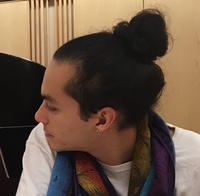 Composer Carlos Snaider ’17 talks about writing emotion and making sound emote at an ARTS FIRST showcase.
Composer Carlos Snaider ’17 talks about writing emotion and making sound emote at an ARTS FIRST showcase.
By Isa Flores-Jones ‘19
There are no half notes, quarter notes or key signatures on a score written by Carlos Snaider ‘17. Instead, an egg-yolk sun leaks across the musical staff. There’s also a tree, a lake, bits of red, orange and green line.
Snaider holds the sheet music up to the light; then he passes the page to Max Ridley ’18, a colleague from Berklee College of Music. There’s a momentary quiet in the music room: Martine Thomas, ’18,

“This sure beats playing brunch music,” Ridley says. “People don’t understand that jazz is so much more.” The bass player holds the drawing away from himself. “Can I have a copy of this?
On Saturday, April 29 during ARTS FIRST, jazz professor Yosvany Terry will join Ridley, Swaminathan, Thomas and Snaider to play Snaider’s composition, part of a group of jazz and experimental musicians. It’s Snaider’s last show, and one that he’s excited to play. During his time at the college, Snaider has studied with Iyer, Terry and Lewis. I spoke with Snaider about improvising intimacy and the experimental music showcasing this weekend at ARTS FIRST.
What will you be performing this weekend?
We’ll be playing three pieces: Chasing the Gradient, which I wrote with Rajna, as well as The Divine Scarab and Patrol Patrol (Who’s Watching). Patrol Patrol was written after the death of Michael Brown; The Scarab was the piece of sheet music that you saw.
How did you develop this form of musical notation?
Essentially it’s like any kind of musical notation – your regular staff, your regular notes. They reduce the sound to a particular notation. Take a G sharp. A G sharp will always be a G sharp, no matter who’s playing it, no matter what inflection. A G sharp is a G; and you can get even more specific about how that note sounds. Improvisation speaks to the expansion of human imagination, and I’m trying to do that through notation. There’s a whole philosophical underpinning to these notations. It’s a different idea of improvisation.
Can you speak more about that philosophy of music?
It’s the project of looking beyond Eurocentric means of engaging with music, looking beyond the West. When looking at a traditional musical score, you’re not working from a place of individual sovereignty. This kind of musical annotation was inspired by a desire to give more agency to forms of visual interpretation. And there are a few musicians I really look up to who use my kind of pictorial musical notation. Wadada Leo Smith is one who uses symbolic notation. And of course, my mentor here, Vijay Iyer, who started teaching here my freshman year. He emphasizes understanding the roots of the music, the history: that we’re here, playing jazz, because of African origins. And that it’s important to create with humility. It’s necessary to be vulnerable. Something that Iyer and Lewis both stress is that, as humans, we’re constantly improvising.
What are you most excited to see, this ARTS FIRST weekend?
There’s so much great stuff. I’m excited to be playing with the Emerging Choreographers showcase on Friday (5 and 7 p.m. April 28 at Arts @ 29 Garden). There’s a lot of really innovative collaboration between dancers and musicians. And in terms of experimental music, Holden Chapel is going to be the place to be.
Creative Collaborations: A Showcase of Jazz and Experimental Music runs 2-4:30 PM Saturday, April 29 at Holden Chapel in Harvard Yard. Snaider, Thomas, Swaminatha and Ridley will perform with Terry at 3:30 p.m. For a full listing of events at Holden Chapel, click here; to read more about Rajna Swaminathan’s practice of improvisational jazz, click here.